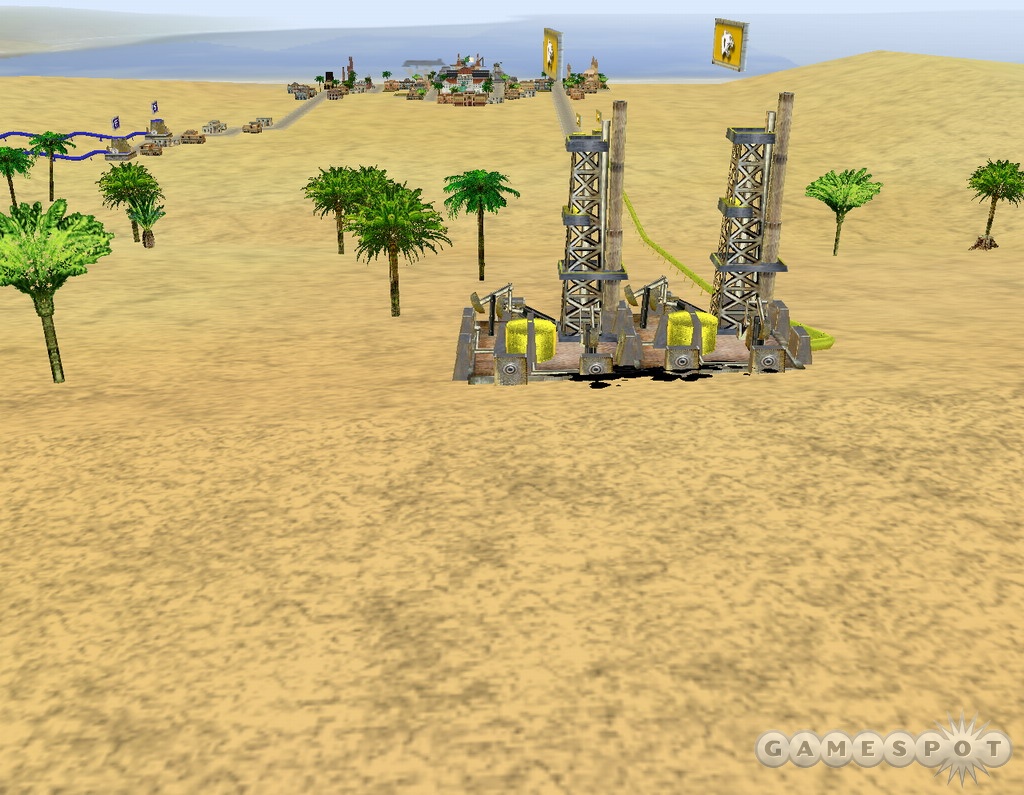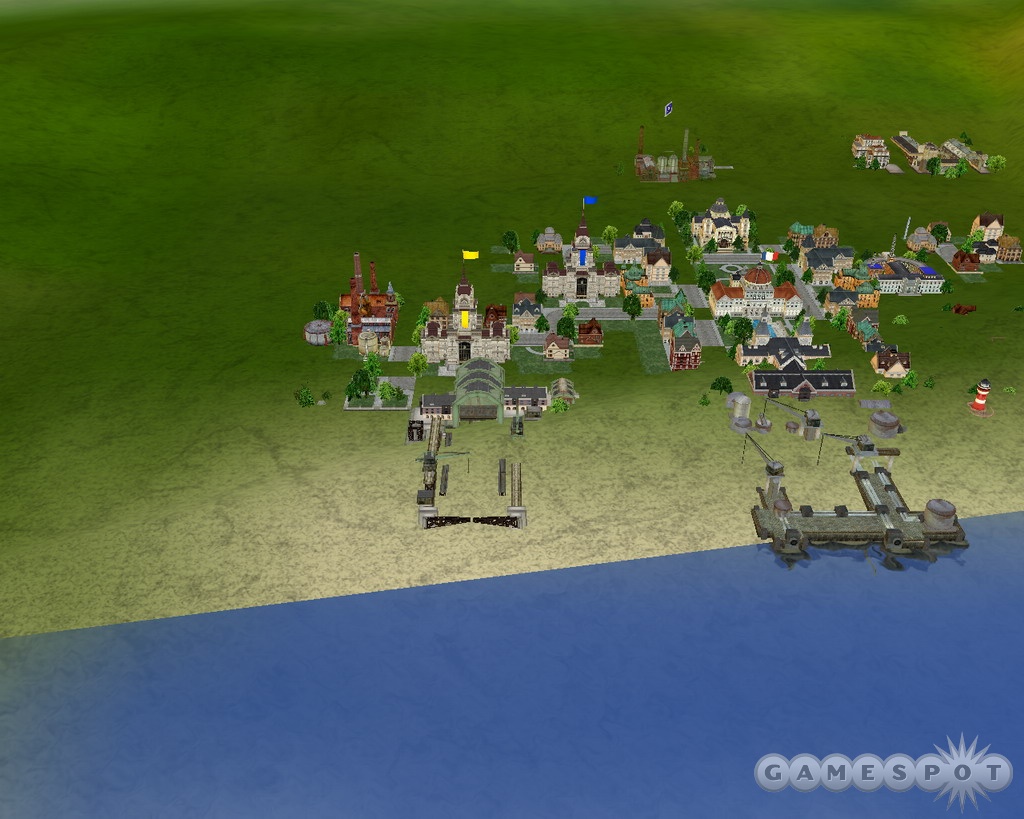Crude oil is some nasty stuff even in virtual form, as evidenced by the ugly mess that is Big Oil: Build an Oil Empire, the latest economic strategy game from Tri Synergy. You might hope that a game that puts you in the role of an oil baron would attempt to capture the excitement of striking oil and making it big or negotiating high-stakes business contracts for mind-boggling sums of money around the world. Instead, Big Oil lends the sensation of trying to coax a sluggish tanker with an inebriated captain at the helm through an endless gauntlet of piercing icebergs. This game is slow, ugly, and poorly designed, and it isn't entertaining in the least.

Big Oil lets you build an oil empire by drilling for oil, shipping it to refineries around the world, and eventually processing it into products that you can sell to the public. You can choose from more than 15 scenarios based on historical events such as the World Wars or the Great Depression. Some of the scenarios are somewhat interesting, and they each have unique conditions for success. However, they all play about the same, which is to say, they all play poorly. You can also choose a freeplay campaign, where you start from scratch and build oil wells and refineries; research new technology to improve transportation and create new products; and develop cities to provide you with workers.
There are two difficulty modes to choose from: easy and advanced. If you choose easy mode, you'll have an annoying helper who pops up every few moments to tell you what's going on and offer to help you with tasks such as chartering ships to transport oil or purchasing drilling rights from cities around the world. This assistant can be helpful because it lets you avoid the headache of slogging through the poorly designed interface to manage your assets manually. However, the assistant is also annoying because when it pops up on the screen, the game stops, and the only answers you can give to its queries are "yes," "no," and "don't remind me again."
If you answer "yes," you'll be taken to the area in question, which is frustrating when you're in the middle of a task in a city on the other side of the world. If you answer "no," you'll have just a moment to finish what you're doing before being asked about some completely unrelated item of business. It doesn't help that the game comes riddled with glitches, which will cause your assistant to, for example, repeatedly ask if you want to build a kindergarten in Algiers, even if that city already has 10 kindergartens to every block. The worst thing you can do is respond to one of the assistant's requests with "don't remind me again." If you do this, you'll never get any such notices again, which means that you'll be uninformed about what's going on, and if you do want to do anything, you'll have to figure it out manually. This can be next to impossible given the game's lack of a tutorial and a severely lacking manual. Even if you look past the apparent design flaws with the forced automation method, playing Big Oil on easy comes down to clicking "yes" over and over to the pop-ups from your assistant and occasionally throwing down a new building or stretch of pipeline.
If you choose to play in advanced mode, you don't have an assistant at all. Instead, you're left to manually manage everything. Also, in advance mode, everything is far more complicated. For instance, constructing an oil well on easy mode is as simple as purchasing and placing a single building on an open oil field. In advanced mode, you have to purchase the oil well, staff it with workers, hire a specialist to manage the workers, maintain the various physical components of the well itself, and so on.
This is needlessly complicated by the game's interface, which seems to be intended to challenge you every step of the way. You're given a few buttons to choose from, which mostly bring up graphs and charts that show you how your company is doing. For the most part, these are all useless and in no way required to play the game. If you want to build a structure, you have to click on a vacant patch of land near the town you want to build in, click a button to bring up the building menu, click on the building you want to construct, drag the building around until you find a suitable spot to place it, and then wait as it gets built. That's way too many clicks to do something as simple as build an oil-storage structure. It doesn't help that there are no keyboard shortcuts or hotkeys, and there's no way to select anything more than a single unit at a time, be it something as large as a refinery or as small as a length of pipeline.
There's also the matter of moving around the map. Since you'll often be managing oil fields and cities around the world, you'll need to move from one area to the next almost constantly. In easy mode, the game will automatically transport you from one city to the next as long as your assistant thinks that's where you need to go. However, if you ever want to explore the map of your own free will, you have to use the mouse wheel to scroll all the way out of the map until you get a view of the entire world, with icons representing each city, ship, refinery, and oil field on the map. You can then click on the city you want to go to, and you'll be instantly zoomed into that city...most of the time, at least. Many times, you can click until your blue in the face and you'll get no response. In that case, you have to zoom in and search for your properties by scrolling around the map. Since you can't see any structures until you're almost completely zoomed in, you'll spend a lot of time scrolling across massive, empty areas searching for your tiny oil well among some trees hundreds of miles outside of the nearest town.
The single-player experience is tedious and frustrating enough, but the multiplayer compounds the bad experience. You can play online or via a local network with up to six players as you go head-to-head to try to become the richest and most powerful oil company in the world. But that's not so easy because to play online, you have to know the IP address of the server you want to play on. As you can expect, the fan community isn't exactly lively for a game like Big Oil, so connecting with other players outside of the game just to get a match together is an exercise in futility. In fact, we never found anyone online to set up a game, or even any inkling that anyone in the world is interested in playing this game. Of course, that isn't much of a surprise.
Big Oil looks ugly and moves like a slug. The units and buildings in the game all look blocky and undefined, and each and every city looks almost identical. The scenery isn't any better, with huge stretches of brown and green smears to represent various terrains and the occasional smattering of unnatural-looking foliage that does nothing to liven up the view. The draw distance is also way too short, and you can't see any structures until you zoom right in on them. The game moves slowly, too. When you mouse over a menu item, you have to wait several seconds for the text to appear explaining what that item is, and many times when you click on a patch of land to bring up a menu, it takes forever for the menu to appear onscreen. The game's presentation also suffers from a dearth of sound. When you click on a research facility you might hear the distorted gurgle of bubbling chemicals, and when you click on a government building you might hear some dull crowd noise, but more often than not, you won't hear anything.
Big Oil is a failure in almost every regard. Sure, it's a budget title, but that doesn't excuse the tedious gameplay, frustrating bugs, and shoddy presentation. There are dozens of better economic strategy games available for the PC, most of which will probably end up costing you less than Big Oil. No matter how much you thirst for a taste of the Texas tea, you'll want to avoid this game.
